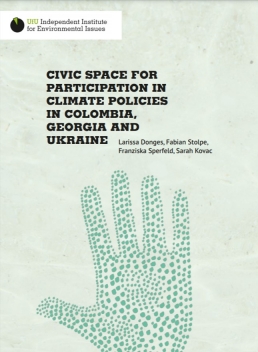8. February 2021
Shaping ambitious climate policy with civil society? In a comprehensive study, UfU has investigated whether and how civil society organizations are involved in national climate policy processes in Colombia, Ukraine and Georgia. The analysis addresses the political and legal framework for participation, existing state and civil society structures, and concrete participation processes in the three countries. Among other things, UfU investigated the extent to which environmental organizations were able to contribute their positions to the current elaboration/revision of national climate protection targets (Nationally Determined Contributions – NDCs). The detailed evaluation scheme developed by UfU makes it possible to investigate framework conditions for participation and concrete participation processes in other countries as well. Together with the project partners and local actors, various obstacles were identified that impede effective participation of civil society. The study derives country-specific recommendations on how participation in climate issues can be improved and consolidated in the future. In addition, the study presents good practice examples for participation in climate policy from eight other countries that can point the way forward.
The study makes clear that improvements are needed at various levels to ensure that civil society actors are heard on environmental and climate issues. In the cases studied, it is primarily procedural barriers that impede an exchange of views, interests and experiences between state and civil society actors and thus a joint solution finding. With regard to the participation formats analysed, three types of deficits can be identified above all: first, a lack of implementation of the participation legislation; second, only a low level of participation; and third, insufficient consideration of the results of the participation process. Much more profound than these deficits of the participation processes, however, is the increasing curtailment of civic space, i.e. the scope of action of civil society, in many countries in recent years, which restricts the participation opportunities of environmental activists. In addition to restrictions on civil society’s ability to act due to the establishment of elaborate administrative and approval processes and government restrictions on the acceptance of (foreign) donations, as well as restrictions on freedom of the press, freedom of expression, and freedom of assembly, harassment, physical violence, criminalization of activists, arbitrary arrests, and assassinations also lead to a reduction of civil society’s space to act in many states.
The full study can be found here:
Click here for the short version.
In addition, individual country reports for Colombia, Georgia and Ukraine have been written and translated into the local languages:
Country report Colombia, English and Spanish
Country report Georgia, English and Georgian
Country report Ukraine, English and Ukrainian
The study is part of the project “Strengthening Civil Society in National Climate Policy“, which is funded by the German Federal Ministry for the Environment, Nature Conservation and Nuclear Safety (BMU) as part of the International Climate Initiative (IKI).



